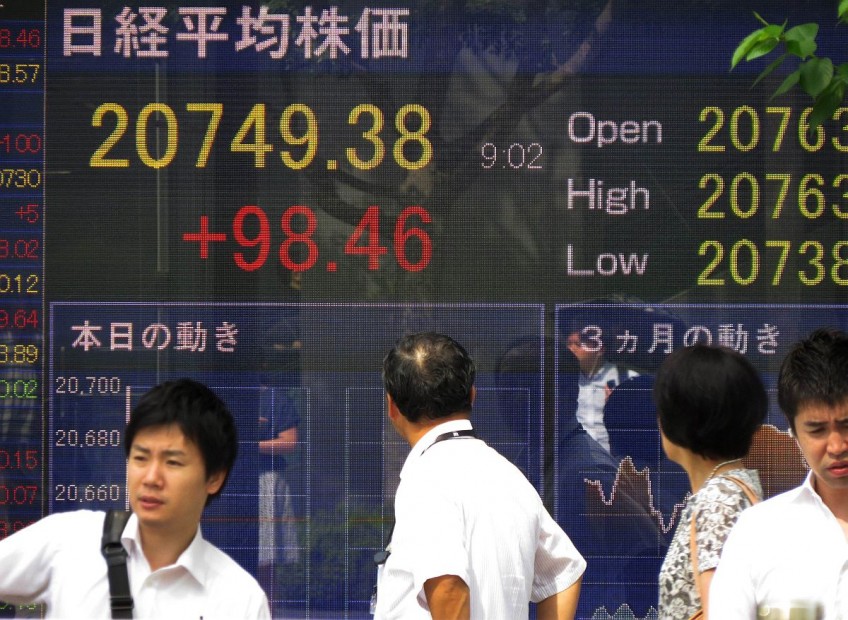Asian shares fall on China worries, Thai blasts

HONG KONG - Asian shares fell on Tuesday, with Shanghai hit by fears a pick-up in the property market will stymie government stimulus while a deadly blast in Bangkok sent Thai shares plunging.
The dollar headed higher against the euro, helped by improving confidence in the US housing sector ahead of the release of US central bank minutes.
Tokyo closed down 0.32 percent, or 65.79 points, at 20,554.47. Sydney fell 1.20 percent, or 64.55 points, to 5,303.10 and Seoul dipped 0.62 percent, or 12.26 points, to close at 1,956.26.
Shanghai slumped 5.09 percent in afternoon trade while Hong Kong shares dropped 0.63 percent.
Thai shares notched their steepest decline this year and the baht slid to its lowest level since 2009 after a bomb attack killed at least 20 people and injured scores in Bangkok.
Asian shares mostly rose in early trade, bolstered by gains on Wall Street and news that US homebuilder sentiment hit its highest level since the recession ended in 2009.
But news that new-home prices rose in 31 out of 70 Chinese cities in July, up from 27 the previous month, knocked shares as investors worried it meant Beijing will not unleash new stimulus to prop up sagging growth.
"The easing that we've been expecting and has been pushing up the equity market a couple of months back is now dwindling away because the property market is doing much better," said Erwin Sanft, the Hong Kong-based head of China strategy at Macquarie.
"For the stock market, it's not great news," he told Bloomberg News.
Fed in focus
he mixed data added to regional jitters about growth in China - Asia's largest economy and a key driver of global growth - which reached fever pitch last week after a shock devaluation of the yuan.
Last week's steep fall scared many investors into dropping Chinese assets and last week Shanghai and Hong Kong shares saw $531 million net outflows - the ninth week of sales out of 10.
Even a pledge Friday by China's securities regulator to keep supporting equities, extending measures unleashed during a market crash in June, has not reassured dealers.
Traders are selling now the market has broken the key 4,000-point level and that is unlikely to change "unless there are some catalysts such as further government support for equities," said Huaxi Securities analyst Wei Wei.
Markets are now awaiting the release of minutes from the Federal Reserve on Wednesday, which could shed light on the US central bank's timing for an interest rate rise.
Speculation the Fed will soon raise its key rate for the first time in almost a decade has strengthened the dollar, while concerns the fall in the yuan could spark a currency war has dragged on many Asia-Pacific currencies.
In Tokyo currency markets, the dollar was quoted at 12.45 yen, slightly up from 124.41 yen in New York late Monday.
The euro traded at $1.1062 and 137.66 yen from $1.1078 and 137.81 yen.
The Thai baht fell to 35.648 against the dollar, touching its lowest point since April 2009 on fears a deadly bombing in the capital could hit the vital tourism sector.
Bangkok shares slumped as much as 2.8 percent in opening deals, their steepest decline since December, before paring losses to a fall of 1.99 percent by early afternoon.
Oil prices slipped as fears of a lasting global oversupply weighed on the market.
US benchmark West Texas Intermediate for September delivery was down 12 cents to $41.75 in afternoon trade. Brent crude for October gave up 11 cents to $48.63.
Gold was at $1,119.23 compared to $1,121.23 late Monday.
In other markets: - Wellington fell 0.29 percent, or 16.66 points, to 5,710.76.
Fletcher Building was 1.81 percent off at NZ$7.58 while Contact Energy went against the trend and rose 0.76 percent to NZ5.28 - Taipei slid 0.44 percent, or 36.2 points, to 8,177.22.
Taiwan's biggest bank Cathay Financial Holding fell 3.86 percent to Tw$44.80 while Fubon Financial Holding declined 3.38 percent to Tw$51.40.